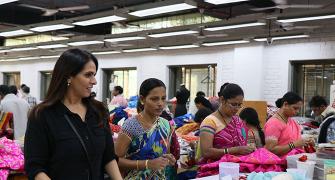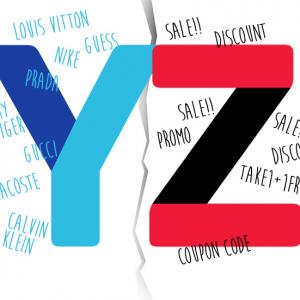Consumers are increasingly opening up their wallets for the intangible promise of ethical manufacturing practices, healthier lifestyles and concern for the environment.
Romita Majumdar reports.

The new consumer not only looks for 'sustainably' sourced products, but also actively participates in discussions and campaigns around them on social media, which is where the ethical-healthy-wellness brands are marketing themselves.
Nykaa recently introduced a range of handcrafted soaps though it already markets products in similar categories from brands like Kama Ayurveda, Soulflower, Soultree and Forest Essentials.
Photograph: Pradeep Bandekar.
What is it that you pay for when you buy a 'hand crafted' natural bar of soap for ₹350 (nearly three times the average price of a regular soap) or ₹8,000 for an organic and traditionally woven dupatta?
Apart from the tangible benefits, it is the brands' intangible promise of ethical manufacturing practices, healthier lifestyles and concern for the environment that consumers are opening up their wallets for.
Sustainable consumption is what consumers want today, especially the conscious millennial, say multiple consumer behaviour reports.
And as the young consumer declares a desire for sustainability -- of the environment, of traditional livelihoods and of personal lifestyles -- brands are falling in line. They are learning the language of conscious consumerism and using the digital medium to target their products more efficiently and keep marketing budgets in control.
Myntra Jabong's recent consumer insights report expects India to be the largest market for sustainable products by 2030 globally with well-travelled and affluent consumers driving this growth segment.
The e-commerce players have experienced 3x growth in this segment over the past year itself, which largely consists of 35-45 year old buyers.
According to a Euromonitor report on consumer behavior for 2018, growing environmental concerns, shifting cultural status symbols and the era of sharing life via social media have all contributed to more and more consumers seeking experiences over things, with millennials leading the way.
This new tech savvy and aware consumer not only looks for 'sustainably' sourced products, but also actively participates in discussions and campaigns around them on social media platforms, which is where the ethical-healthy-wellness brands are marketing themselves.
Personal care e-commerce player Nykaa recently introduced a range of luxury handcrafted soaps while the e-tailer already markets a range of products in similar categories from brands like Kama Ayurveda, Soulflower, Soultree and Forest Essentials all of which have a considerable presence through digital marketing as well as social media influencers.
Myntra will be exploring this segment for their upcoming personal care range of products as well.
"Research agencies show that both globally as well as in India, there is a strong shift towards more 'naturally driven beauty solutions' especially in skin care and wellness. Surveys on the industry for instance, reflect this trend and predict that the organic skin care market is likely to grow by 15 per cent in the next two years," said Reena Chabbra, (FSN), Nykaa.
Chabbra adds that there is a growing interest in personal health, fitness and overall well-being, and they see very strong demand from customers in these categories.
Consumers are increasingly willing to spend on clean labels and natural products, and even willing to pay extra for sustainable offerings.
The communication regarding the products is strongly focused on the goodness of the high-quality ingredients and how they address skin concerns, she adds.
The premise lies in the way it addresses the 'need gap' in the market for a more personalised, lush and sensorial bathing experience (soaps, for instance), while offering unique benefits that they might be looking for.
While customers seek 'organic' and 'sensorial' experiences from personal care products, they look for stories in sustainable apparel.
Interestingly, the new consumer is being assiduously wooed by a set of new brands on digital media platforms.
The old brands that did cater to a similar category of consumers were mostly state-run emporia, or the government-owned Khadi Gramodyog outlets and in the premium segment, Fab India and a few local players.
These brands are missing in action, mostly because they have been slow to go where the young consumers shop -- on social media and e-commerce platforms.
Tamil Nadu-based Ethicus might not have the same physical presence across malls or brick and mortar stores in the country as the old guard, but it has no rival on Instagram where it is identified with Indian handlooms.
Others are picking up the ropes and in recent months, Cooptex (Tamil Nadu Handloom weavers Cooperative society), Utkal Amrita from Odisha or Assam based Srishti Handlooms have used the digital platform to reach the right audience.
Digital platforms, apart from helping such brands disseminate the right information to the right audience, also help build a story of change or a movement that goes viral and benefits the brands.
For instance, a move to make sarees more popular has seen the popularity of the garment soar in recent years. Several campaigns have helped create a community of buyers and influencers that brands such as Ethicus have been able to build on.
Vijaylaxmi Nachiar, founder, Ethicus says that campaigns such as #SixYardsAnd365Days started by Sunita Budhiraja have helped hugely.
Members of the group have associated themselves with weavers across the country and membership has ballooned from 3 to 25,000 members globally since inception two-and-a-half years back.
Similar movements are driving the proliferation of clean labels in food and beverages too.
RAW Pressery, JusDivine, Yoga Bar, Buffalo Back and 24 Mantra have benefited from the prevalence of groups that are leading the shift to a more organic-natural lifestyle.
Recommended for you
The Raw Pressery Story: ₹5 crore to ₹250 crore in just 42 months!











